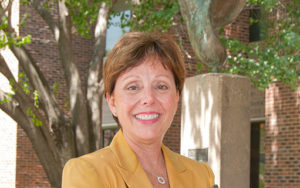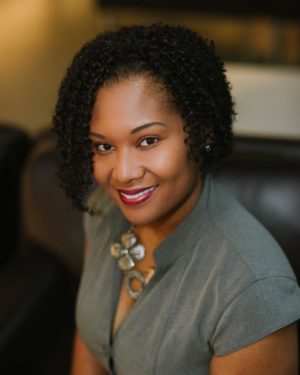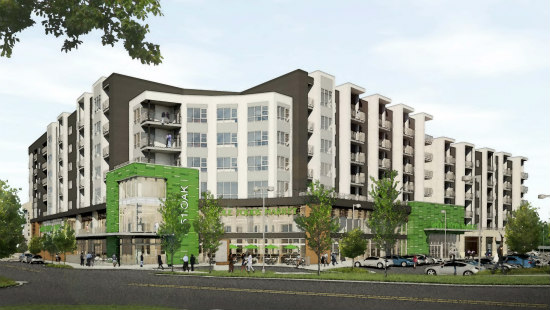Time for Spectacular to Happen
A cheering crowd of students, faculty, staff and Kansas City community members gathered in the Olson Performing Arts Center Feb. 9 to extend a warm welcome to University of Missouri-Kansas CityChancellor-Designate C. Mauli Agrawal.
The text of Agrawal’s speech is below:
Thank you, President Choi. I feel honored and privileged that you and the Curators of the University of Missouri System have chosen me for this very important position. And I feel truly humbled. At the same time, I am very excited about the opportunity to lead UMKC to new levels of excellence.
I would like to also thank the members of the search committee; the campus and community leaders who have been so warm and welcoming to me and my family; the students, faculty, staff and stakeholders gathered here this morning; and particularly our interim chancellor and provost, Barbara Bichelmeyer. I truly look forward to a long and fruitful partnership as we work to create the great university that Kansas City needs and deserves.
Good morning Roo Nation!!
It was only a few weeks ago that I was approached at a meeting in Austin, by a very dear friend and mentor of mine, Dr. Guy Bailey, who as some of you may recall, was a former Chancellor at UMKC. He told me about the chancellor search here and encouraged me to apply. But he also told me I should look into it quickly – the deadline to apply was in 48 hours. And so, I drove home and got on online. What I found was truly amazing!
UMKC, with its top rated programs in the arts and theatre, its various schools in the medical disciplines, biological sciences, engineering, management, and education, has all the elements that are needed to make a great university. But that alone is not sufficient. You also need the right environment.
So, I looked at Kansas City. And I nearly fell off my chair – I do not know how you all have been keeping this such a secret but this place is a city on the rise. It is on so many top ten lists –high paying jobs, entrepreneurship, cities to watch, music scene and yes, barbecue!
The combination of UMKC and Kansas City, if put together in a dynamic, symbiotic, rhythmic partnership, can make extraordinary things happen here. This combination, right here, is waiting for “spectacular” to happen!
I would like to tell you a little bit about my journey to this day. Sir Isaac Newton once wrote and I paraphrase:
The reason I have been able to see far is because I have stood on the shoulders of giants who came before me.
He was talking about other scientists who preceded him. However, all of us here today, are here because we have stood on the shoulders of our own giants. My giants were my parents. My father came from a small village in India and was brave enough to be the first generation to college. My mother came from an educated family, but was the first female in her family to go to college. But she did stop there. At a time when few women in India went to college, she went on to get a Ph.D. and teach college.
I grew up in humble circumstances. My parents were entrepreneurs who worked together at small scale manufacturing businesses. They made just enough to put food on the table and I did not grow up with a TV, or air conditioning, or a refrigerator. That can be a bit tough when the temperature outside is 115 degrees, but that was life. My parents made immense personal sacrifices to make sure that I went to the best high school in town and the best engineering school in the country. My giants are my parents and the reason I stand here today is because they gave me the gift of education. I have lived the American Dream and truly, truly believe that education is the key to success.
After finishing college, I worked in the automobile industry for a while and then came to the U.S. to get a Masters. The plan was to go back. But I fell in love. In love with the American model of academia and research. And in love with someone else.
I like to tell the story that on the third day after my arrival in the U.S., I chanced upon this female graduate student in engineering registering for classes next to me. Five years later she became my bride. And this June we will be celebrating our 30th anniversary. My wife and best friend, Sue, is here today. Sue, will you please stand up and wave?
The most important reason for working at a university is to inspire and prepare students. This mostly happens through the interaction between students and faculty where knowledge transfer and discovery take place.
I will ensure that UMKC has a culture that is student focused. We should always try to meet the student where they stand academically, even if they are not where we want them to be. Then, without dropping any standards, we should provide all the help to the student to graduate. When it is clear that a student needs help, we should ask ourselves the question – “What would I do if this was my own child”? And if we do, we will always know what to do next. I think of all students as my children, which would mean that I will have roughly 17,000 UMKC children. That is a big relief because currently I have 31,000!
I think of myself primarily as a faculty member. This year is the first time in my career that I have not taught a full course. Over the past few years I have been teaching a freshmen course with 60-70 students. And I loved it! I have also continued to be involved in research and publications despite my 12-13 years in administration.
So UMKC faculty, you will have a friend in me and I look forward to involving you in finding solutions to the problems that confront us. Provost Bichelmeyer, the deans, and I will work closely with you to help you make our students successful, perform extraordinary research and scholarship and make UMKC the great university it is destined to be.
UMKC staff, you will be at the table as well. I realize that staff are the glue that holds the university together and your role and your input are both exceedingly important.
Public universities were created with the goal of bringing enhanced prosperity to their region. They do this by being knowledge enterprises – they both disseminate knowledge and create new knowledge. I believe they have an unwritten but binding social contract with their communities to be instrumental and perhaps even partly accountable for the economic development of the region and the social, cultural and health well-being of the city and the region.
This is where the modern urban university can play a very significant role. In this model, the city becomes a test bed for solutions for societal issues – solutions that are based on university research and scholarship to impact the neighborhoods and communities that surround us.
In my new role, I will work with the Mayor, the city manager, civic and business leaders and our alumni and assist them in building a 10- to 20-year master plan for the economic development of Kansas City and make sure that UMKC will be able to produce a workforce with the specific skills needed for this growth.
For Kansas City to be great, UMKC has to be great because all great cities are anchored by a great university. I am confident that with UMKC and the city working together, UMKC will become a university recognized widely for its excellence and Kansas City will emerge as one of the top cities of the 21st century.
IT US OUR TIME AND OUR TURN FOR “SPECTACULAR” TO HAPPEN.
In summary, I will propose five pillars for our path forward at UMKC. And these align well with the strategic plan.
- Exceptional Student Experience
- Thriving Knowledge and Discovery Enterprise
- Exemplary Model of the Modern Urban University
- Invigorating Globalism and Multiculturalism
- Strong and Resilient People, Process and Physical Infrastructure
These may seem like wonderful plans, but to be able to execute them we will have to confront the realities of declining resources and the lack of college readiness of many students. We will have to continually look for efficiencies in our processes, realign resources to focus on strategic initiatives, and also look to generate new revenue sources such as stackable educational programs delivered online. We will have to be bold and take some risks.
An old saying states “Ships are safest in a harbor, but that is not why ships are built – they are built to sail the seas.”
And bold we must be, because we are in the business of transforming lives. Some of you have already heard me tell this story but let me go ahead and tell it again. My wife’s passion is childhood literacy and she works extensively with non-profits in this arena. One day, she was volunteering her time stacking books they had collected and got talking to a young man volunteering next to her. Turned out it was a student from UTSA, my current institution. Sue did not reveal who she was (i.e. the wife of the UTSA Provost) and soon the student told her more about himself. He was getting a double major in cyber security and criminal justice. Upon graduation this young man would easily fetch a salary of $70-80k. Turns out he was from Uvalde, a small, hot, dusty Texas town, south of San Antonio. His father is a ranch-hand and for a living fixes barbed wire fences in the hot Texas sun. In one generation, through the power of education, his son will lead a very different life. That is why, despite all challenges, we cannot stop doing what we do. I know UMKC has these stories, too, and I look forward to creating more of them with you.
Lastly, I will close by emphasizing the need for continued diversity and inclusion on our campus. Projections show that the forthcoming increase in college students will come primarily from minorities and under-represented groups. Often, the support systems needed to make these students welcome and successful are different from what most universities have traditionally put in place. The universities that adapt and create an environment of belonging and affinity on campus will survive.
I will create a strong sense of family on campus – la familia as we say in south Texas. As part of that, we need to have great pride in UMKC. Pride that is unabashedly and unapologetically loud at times.
At my present institution we introduced a chant that first became very popular among our students and then got adopted by our faculty and staff as well. It is now not unusual for groups to spontaneously break into this chant at gatherings.
I am sure that they would not mind at all if we borrowed this chant and modified it to make it our own. I will give you a demo with the help of a few enthusiastic students here and then let us all join in. And be LOUD! THANK YOU!
UM – KC
UM – KC
UM – KC
Go – Roos – Go!
UMKC Chant (Download video from reception)
 Jackson is a 1978 alum of UMKC’s innovative six-year degree program and has been a faculty member since 1984. She is a professor of pediatrics with a specialization in infectious diseases, holding a clinical appointment with Children’s Mercy, one of the school’s partners in the UMKC Health Sciences District.
Jackson is a 1978 alum of UMKC’s innovative six-year degree program and has been a faculty member since 1984. She is a professor of pediatrics with a specialization in infectious diseases, holding a clinical appointment with Children’s Mercy, one of the school’s partners in the UMKC Health Sciences District.





